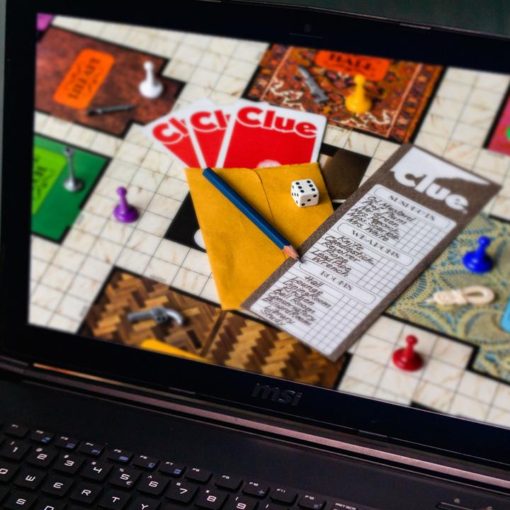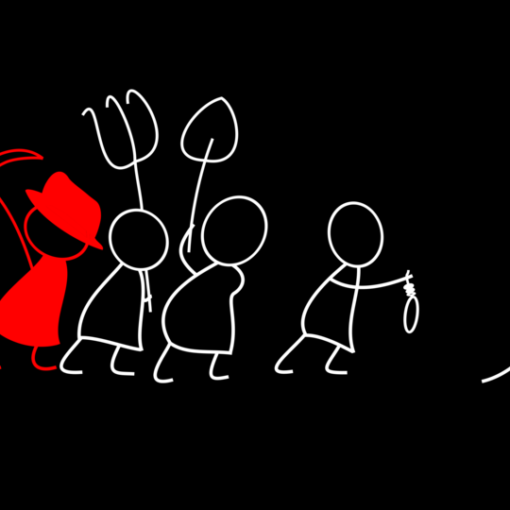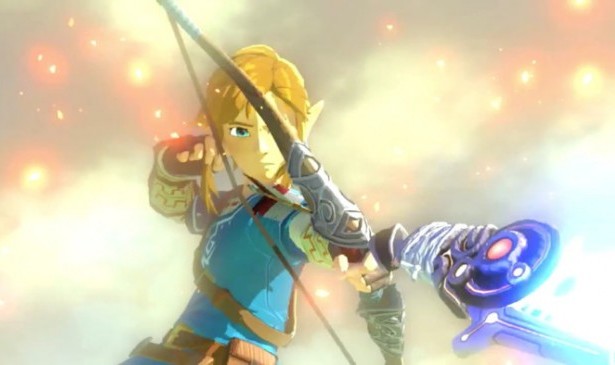What exactly marks a good writer? I don’t know that there’s a real answer, even with two creative writing degrees under my belt. I can break down a story and analyze the elements, the way everything fits together, the way it might weigh in on various scales of quality, both objective and subjective, but to make a definitive statement about the particular qualities necessary in a good writer may well be impossible. After all, the qualities inherent in a good television writer are different from those in a short story specialist are different from those in a novelist, and while there’s overlap, certainly, there’s also enough difference that sometimes it seems each kind of writer is working in entirely different realms. Introduce interactivity into a story, too, and maybe everything breaks down wildly. Once an outsider is drawn into the narrative, and given the ability to change it, however minutely, so too do the rules change.
So maybe there’s no easy way to qualify a good writer, but I can state with some confidence that there are plenty of ways to tell bad writers. Bad writers rely heavily on tropes without purpose, they recycle content, they create shallow characters who don’t seem quite human. They expect us to believe there’s suspense when we’re told it’s there, whether or not there’s any reason to feel suspense. They rely too heavily on jokes and devices that don’t further the story. They give and they take away outside of actual organic conflict or development — things happen in stories written by bad writers not because they should happen, but because bad writers have decided that’s what’s going to happen. Of course, this isn’t a definitive list, and it’s quite possible to use some of these things for good: false suspense as red herring, for instance, or tropes that seem lazy but later may highlight something else. Overall, though, this is the beginning of a good working list.
And most game narratives? Feature a lot of bad writing. Worse, we know it. We talk about it, we complain, but we accept it, and because we accept it — and sometimes, even praise it, if it’s some of the better bad writing we’ve seen — that trend will change slowly, if at all.
There are two main areas to discuss about when we talk about less-than-great writing in games: character and narrative structure. The first, to me, should be non-negotiable, to a point. Good stories are built from good characters, and we don’t need extensive voiceover or even time to develop a good character. Sure, we might benefit from extensive time discovering or even building a character’s story, but a particular gesture, a reaction (or the absence of one), a certain word chosen over another, a hint of backstory, explored or not — all these factors can help reveal great characters in quick strokes that don’t impede the narrative. Games, unfortunately, are limited somewhat in scope by technology; characters are still a little inhuman, even in our best games. Gestures, in particular, often look a little unnatural in all but the best games, and that makes it hard to pack something real into how people move and interact. So too with facial expressions.
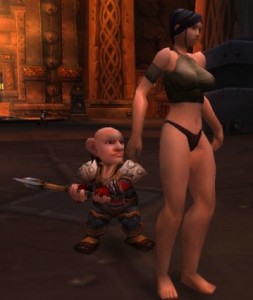
Script, then, is where we need to pick up the slack, using that tool to build characters who speak precisely as they should, regardless of whether narrative is meant to tell a firm, unchanging story, or if it’s a narrative based on player action or even choice. But… is a pure narrative, untouched by the player, even possible? If we don’t react fast enough, if in actions we’re faster or slower than might be expected, or even if we die and have to respawn, hasn’t the narrative been changed, if only to our eyes? In an open-world game, if you skip an area, too, the game is forever changed, even if you don’t notice. Or what if you’re a roleplayer in an MMO, trying your best to play things straight, as it were, and people come jumping and frolicking past you, weird names and tags on display? Despite your efforts, and the game’s design, the narrative has been broken.
This idea that no narrative can actually be “pure,” totally unchanged by the player, is interesting, though, because when I play choice-based games — everything from Mass Effect to The Walking Dead — I often feel like gameplay is a little too pure. No matter what you choose, you end up in the same place. Maybe one or two of the people with you is different; maybe someone sees you differently, but gameplay doesn’t often change in a large, persistent way. This, like character expressions and gestures, would seem largely a limit of technology; to do otherwise would require coding whole new scenarios, recording lines of dialogue that may never be used, writing whole new possible scenes. It’s a lot of work. It’s a second game, or a third, or fourth, packed into one, and so we’re generally limited to a set narrative structure. At some point, these things will happen, sometimes in a given order. Call me selfish, though, because that’s what I want. If I’m interacting in a story, I want the ability to really interact and change outcomes, not just choose whether or not to personally unleash an evil that may be unleashed anyway, regardless of my own decision.
I guess I’ve circled back to another question: is the problem of gaming narratives a writer problem, or a problem of technology? I think the answer is both. I’ve watched listings for games writers over the years, just as I’ve watched game narratives develop as a player and an occasional critic. The industry, ever-evolving, seems to be privileging writing more, which I think is wonderful… but that ever-evolving nature means that writers have taken dozens of paths to get where they are, and the industry is still looking for people with wildly varying background experiences. What makes a writer? Maybe no one knows, but we sure don’t know what makes a games writer, from looking at career paths and job listings. Maybe the requirements change based on what any given studio privileges, or what they need for a given property, but there doesn’t seem to be any clear path of training for games writers, no shared focus on character or narrative structure from a particular approach. “Understand games,” the listings say, over and over, “and what makes them good.” Tall order. “Be willing to see your work changes,” many others read, and that seems a realistic requirement, but sometimes, I wonder if it doesn’t also mean something can get lost in the process.
The three games I’ve played most recently are Destiny, Life is Strange, and Resident Evil: Revelations 2, a fascinating set because of overlaps, with two of the games being episodic, but only one of those being more of an adventure game or interactive fiction, and while Destiny has a very intriguing story, I feel that it’s also a take-it-or-leave it kind of story. You can completely ignore it if you like, or you can ponder questions of perspective and moral dilemmas while taking aim at praying enemies, or anything between. There’s a lot there worth discussing, but we’ve covered it and I don’t want to give it short shrift, so I may revisit later, and I may not. But as for the other two? Great examples of different versions of the writer problem in gaming narratives.
The Resident Evil games have always been a little strange to me, what I’ve played of them, at least, because they don’t feel particularly Japanese, not in the way of a Final Fantasy game, for instance. The gameplay and movement is more consistent with Japanese games I’ve played, but otherwise, sometimes I have to remind myself that these titles are moving back and forth through translators and localization teams and things are being moved, shifted, changed to fit different cultural narratives. These games, too, fit into a very specific place in gaming: survival horror, which has its own tropes and expectations, contracts with the players that define certain events. But just as with horror films, the best writing can usually be found in those properties that at least shake the molds up, if they don’t go all out and break them. Plenty of great recent horror films have taken tropes and old ideas and done really interesting things with them, like The Babadook and Insidious; while there are moments in these films that are unexpected, certainly, they’re playing on well-trodden ground. It’s the characters, the writing, the acting that elevates the film, and with Resident Evil as a whole, much less this latest piece, I’ve never found anything that felt more than what was absolutely necessary, and that disappoints me. Yes, there are stories. I do not find them particularly engaging or revelatory. The dialogue is sometimes snappy, other times cheesy to eye-rolling extremes. Ultimately, despite the early titles’ indelible impact on a gaming genre they were helping create, the individual installments are forgettable.
Even franchise fans usually point to iconic moments of scare or scope when reminiscing about the series, and of course, that begs a question: is that all a game needs to be? Do we need deeper stories or characters?
Plenty of people have argued that we don’t. Again, with Destiny as an example; the story can be fully ignored and the game still be enjoyable. But I wonder if I wouldn’t have enjoyed the Resident Evil games if, over the years, the writing had grown stronger. If they’d taken some of their own molds and shattered them with strong characters and unforgettable moments of tension and drama alongside boss fights in boats.
Some will disagree, saying deeper characters and narratives can get in the way of gameplay, but I’d submit Left 4 Dead as an example. We know Bill, Zoey, Francis, and Louis when we’ve played that game at length. They have quirks and personalities. Francis hates everything. Zoey struggles a little with her feminism in the face of the apocalypse, or at least, is willing to sometimes be a damsel if it means not dying. Louis’s positivity is tinged with desperation. There are stories there, and while they’re explored in narratives outside of the game, I loved them all and thought of them as individuals before I ever saw a single panel of comic, and never once does their development impede gameplay.
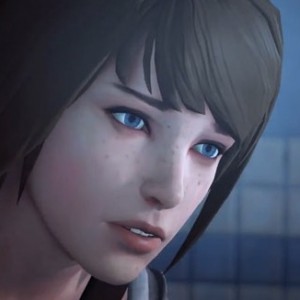
Which leaves me with Life is Strange, and it’s strange indeed. There is a story here, a story of a town with secrets, of overlapping relationships in and around a high school, of politics and society. There’s a mystery, too, and a heroine with a newly discovered superpower that may allow her to change the course of things. The narrative attempts a lot of depth — when Chloe talks about the missing Rachel Amber, for instance, there’s real feeling there. I’m curious about Kate, and what’s happened to cause everyone to hate her. The game has done well with these moments, in creating people who have stories, but overall, there’s something flat about the narrative. Something that doesn’t quite connect, and I don’t mean that the voices don’t sync with the characters. Max’s lack of real reaction to seeing Chloe shot and to the discovery of her power is tough for me to reconcile. At first, it’s fine; she’s desperate to recreate the scene and get to the bathroom… but not so desperate she won’t mine her newfound ability for a few points with a favored teacher. I’ve struggled with this, asking myself if this is meant to build complexity, to show that Max isn’t just a good girl heroine, but that doesn’t seem to bear out. She is genuinely freaked and wants to save Chloe, but the game’s structure is bent on making sure the player understands the mechanic and everything that can be done with it first, and that rings false. But is it necessary for mechanics, for play — or is it a misstep in narrative design?
I don’t think it’s as simple as pointing to the idea of ludonarrative dissonance here. It isn’t as though you have a lot of freedom as Max; in fact, as with so many ostensibly branching games, you don’t have nearly enough freedom. You cannot create a Max who steps in against a hallway bully, even though it fits with almost everything else she does in this episode, and her inner monologue expresses her desire to step in. Why is Logan an unstoppable force when the creepy security guard is not? It doesn’t hurt the narrative if Max can interrupt, except that it requires more work, the coding of an additional choice, and maybe a ramification later, but since nosy players will discover Logan has some depth, there’s place for it in the story. The option simply isn’t there. It isn’t on the table. Similarly with not checking in with Warren after he takes a beating on Max’s behalf. Yeah, Max seems a little oblivious to Warren’s feelings for her, but he’s still her friend. What person wouldn’t check in, if not attempt to reverse time and stop the fight?
It’s easy to chalk this up to problems of ludology and the necessity of limiting the game, but this is something even more basic, I think: the backbone of strong character development, and how character shapes story. Good stories happen when people are messy and emotional, when they make bad choices. Max here is offered fairly good choices throughout, and perhaps that will change as she becomes more desperate, and more comfortable with her power, but there’s no emotion here. No messiness. Even when ostensibly panicked for a possibly dying girl, she impresses the teacher. Teen selfishness? Mechanics? Or a failure in character design on an emotional level?
Writing games simply isn’t like anything else. It’s a Choose Your Own Adventure approach to movies with a side of novel — or graphic novel — thrown in. It’s improv for us, at times, but heavily designed by, well, designers, and sometimes, the designers are just that, designers and not writers. Or they fell into writing by way of blogging, or by simply being the person at the table with the best grip on story. Or maybe the focus is on creating the story, the narrative, and all the ways mechanics weave in and out of that, and no one stops to think… should this teenage girl maybe stop and have a complete freakout over what she’s just seen and heard, or should she instead go dump some paint on the school’s queen bitch?
When I began writing, I was thinking largely about good writing versus not, but the issue is more complex than that, or rather, it isn’t only that. Max’s odd lack of emotions and reactions is as much bad writing as is it is when any character in a first-person narrative stops to look in a mirror to tick off their features for the reader’s convenience. But Life is Strange is also a relatively strong, compelling example of what a games story can offer, despite narrative limitations in terms of technology and diversity, not because games can’t do more in terms of story creation, but because we don’t expect any more. And maybe it’s time we did.


